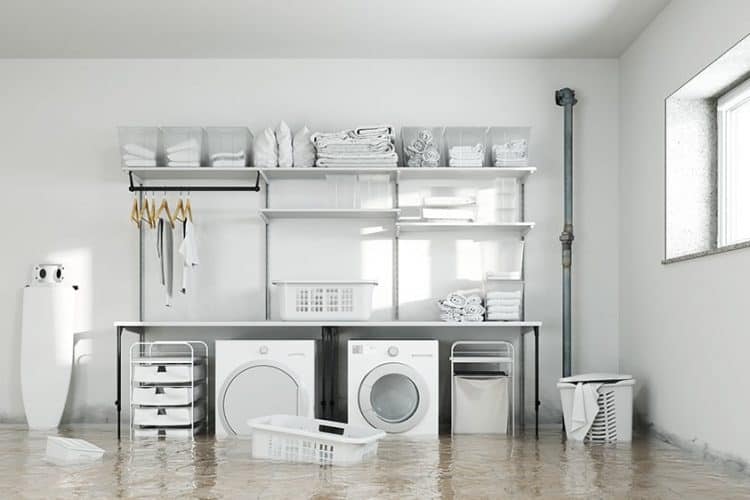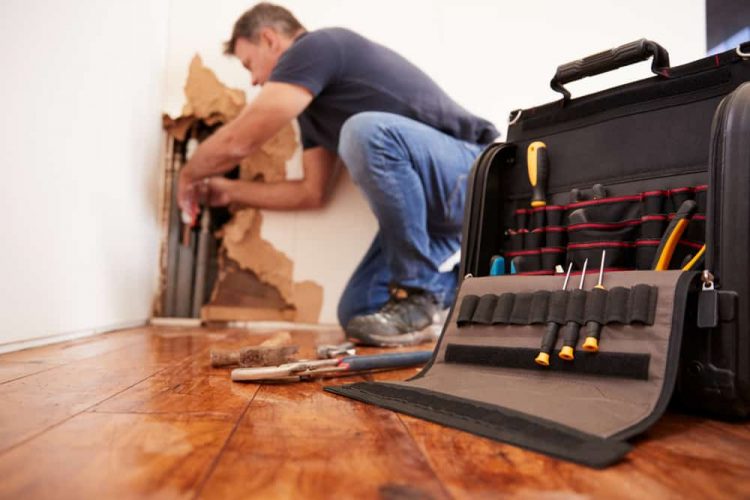People may have differing opinions about winter, but whether you love it or loathe it, it’s still important to take care of your home during the season. Otherwise, you could end up with unexpected property damage and more expensive utility bills. The experts at 1-800-Water Damage have come up with a couple of tips on how to winterize your home, so you can keep it warm and cozy all winter long—without the expensive heating or water damage restoration bills!
Winterize Your Home’s Windows
Windows let the winter sunlight in, warming your home with natural energy, but if they’re not properly maintained, they can leak in the winter air, making your home significantly chillier. Your windows can account for as much as 30 percent of your home’s heating loss. Luckily, winterizing your windows can help winterize your home as a whole.
Checklist for Winterizing Your Windows:
- Check your window frames
- Remove window-unit AC
- Re-caulk window trim
If your window frames are wooden, they can warp over time, making them vulnerable to letting in the chilly winter air. Replacing your wooden window frames with vinyl frames can help keep your home warm & save you money.
With cooler weather days, you probably won’t need to be running the AC. If you still have a window-unit air conditioning installed, it’s time to take it out—air can get through any cracks between your unit and the window.
Another way to winterize your windows? Caulking the trim around them! This is one of the quickest energy- and money-saving tasks, and it can help prevent a lot of air from seeping into your home. Caulking around your windows can save you from 10-20 percent in energy savings, making it a total winterizing win.
Protect Your Pipes from Freezing or Bursting
Although pipes can burst any time of the year, they’re especially susceptible to this in the winter time. When the weather drops to below freezing levels, your pipes can freeze, expand and ultimately, burst.
Checklist for Winterizing Your Home Water Pipes:
- Let faucets drip
- Circulate warm air under sinks
- Improve pipe insulation
One of the best ways to prevent a burst pipe this winter is to keep the faucets in your home on a light, but consistent, drip. Although this doesn’t seem like much, this will allow the water in your pipes to flow freely preventing them from freezing!
Another easy way to keep your pipes from bursting? Opening the cabinet doors of your sinks will bring warm air closer to the pipes, keeping them from getting too cold. If your home has crawl spaces in it, sealing them off can also help prevent pipes from freezing.
Lastly, insulating your pipes with heat tape or pipe insulation is a great way to protect them and can help decrease the chances of your pipes bursting this winter. In case your pipes do freeze, make sure you shut off the water and contact a plumber immediately.
Read our full post about frozen pipes here.
Check Up on Your Home’s Exterior
Keeping your home warm and cozy on the inside starts on the outside. Checking for and addressing issues with your home’s exterior is one of the best ways to winterize your home.
Checklist for Winterizing the Exterior of Your Home:
- Replace roof shingles
- Repair damaged mortar
- Seal up the foundation
Has your roof seen better days? Replacing missing, damaged, or dilapidated shingles can help keep your home warmer in the winter. It also helps prevent water from slowly leaking in if you get any major snow or ice accumulation.
If you live in a brick home, you may want to check the mortar and make sure it’s in good condition—if it’s not, you may want to consider getting it repaired. When mortar is damaged or deteriorating, it can let cold air in and also absorb moisture from outside, which can eventually cause mold to grow in your home.
Another component of your home that you should check is its foundation. Cracks in the foundation of your home could lead to water damage, which can cause costly problems down the road. If you find cracks in your foundation, you’re going to want to contact a professional to seal them up.
Preparing for the winter weather can save you time and money in the long run, but even with these tips for winterizing your home, accidents happen. From burst pipes to water damage restoration, the experts at 1-800 WATER DAMAGE have you covered whenever property damage strikes in the winter–or any other time of year. You can contact us 24/7/365 for all of your flooding, mold, fire, sewage, and critical cleaning needs.



